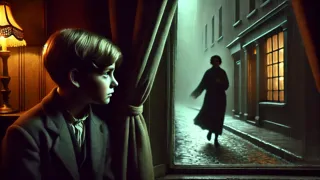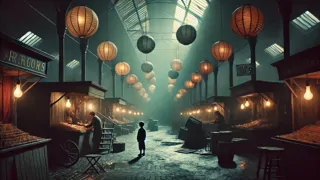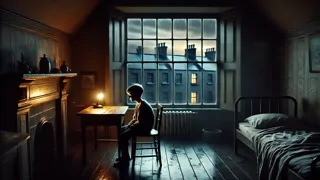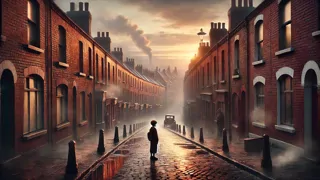Introduction
At the turn of the twentieth century, on the north side of Dublin, the days often began with the sound of milk carts trundling down narrow, cobbled lanes and the faint laughter of children echoing between rows of red-bricked terraced houses. The city’s grey winter mornings brought a chill that seeped through every stone, and the air, heavy with the scent of peat smoke, clung to everything. In one such winding lane stood the house where I grew up—an ordinary place, unremarkable by the city’s standards, but for me, it was a microcosm containing all the mysteries of youth. I lived with my aunt and uncle, who rose each morning shrouded in the routine fog of habit and worry. Their whispers at breakfast spoke of bills and weather, but there was little comfort to be found in such adult preoccupations. Instead, I drew my comfort from the delicate rituals of childhood: the way light pooled in corners as the day wore on, the thrilling rustle of paper as I leafed through borrowed adventure books by the window, the silent bond among the boys who played in the blind end of North Richmond Street after school.
Beyond our dark hallways, life delivered its moments of unexpected light—a patch of dandelion struggling up between the paving stones, or the rare, bright smile of Mangan’s sister. She lived next door, a figure half-hidden, her presence like a shaft of sun through winter clouds. In the narrow world of my adolescence, she was the very definition of grace. The soft swish of her skirt at the doorstep, the hush of her voice in the dimly lit hallway—these became the sacred events around which the slow days orbited. I observed her from afar, crafting in my mind a vision more elaborate and profound than anything reality dared to offer, for what did a boy know of real love but the intoxicating ache of longing and shy devotion?
Dublin, for all its noise and bustle, seemed to pause for her. Even the streetlamps, blinking into the evening, shifted their glow so that she might pass by untouched by shadow. My mind became a theater in which she played the perfect lead, her every gesture elevated, her every word a secret gift for me alone. This illusion wrapped itself around me with comforting finality, until the promise of the bazaar—a dazzling, exotic place called Araby—presented itself like a beacon of hope. It shimmered on the horizon of my days, beckoning with the promise of gifts, adventure, and perhaps the chance to finally bridge the impossible divide between us. If only I could go to Araby for her. If only I could bring back some token, something rare, she would know the extent of my devotion, and my feelings would finally make themselves known. It was hope, pure and fragile, that lifted me above the grey rooftops of our cramped city and sent my heart leaping toward impossible dreams.
The Spark of Devotion
Each morning, the first thing I searched for was the briefest glimpse of her—the girl who lived next door. Her real name I barely dared to speak, even to myself, so potent was the spell she cast upon the moments of the day. I remember watching from our parlor window, heart thumping, as the street slowly woke—a milkman’s call, the dull clatter of bins, the sullen faces of men on their way to work. And each day my world shifted, imperceptibly but certainly, with the sound of her door, the faintest click of the latch, and the trailing hem of her dark dress across grey flagstones. Her presence was my own personal weather, turning even the most sodden Dublin morning to gold.

I played football and hide-and-seek with the boys, sharing rumours, secrets, and cruel jokes. But all the while my thoughts remained elsewhere. My mind’s eye painted her in colors no artist would dare—her hair like the sun-washed chestnut of lost evenings, her eyes full of distances I could only dream of crossing. I felt self-conscious when she stopped to speak, her words set adrift between us, simple and innocent, but somehow bearing impossible weight. She’d ask absentmindedly about school or remark on a stray cat in the yard. Each syllable became a treasure to be hoarded and replayed, long after dusk had fallen.
Then, one blustery afternoon, came the talk of Araby. The bazaar was all anyone mentioned—the nuns at school, the boys in the street, and even the shopkeepers who pinned up colorful posters in their dusty windows. But it was her excited mention that sent my heart leaping: 'Oh, I would love to go. I can’t with the retreat at the convent.' Her regret lingered, and in a moment that sent a bright, secret thrill through me, she turned her hopeful gaze to me: 'If you do go, will you buy me something? Maybe a little gift from Araby?'
From that instant, Araby was transformed. It was no longer just a bazaar—a place to wander through odd trinkets, beguiling stalls, and foreign voices. It became my personal quest, my chivalric trial, a journey of secret importance. At night, I lay in my cold room conjuring images of the exotic East, thinking only of the gift I would bring her. I imagined standing before her in the pale glow of morning, her eyes alight with wonder at whatever token I had managed to obtain. It would be proof that I was different, that I saw her as no one else in our sleepy avenue did.
I spoke little of my plans, though the anticipation made my days brighter and my chores less laborious. My uncle, distracted as always, would come home late and forget himself in the daily newspaper, oblivious to my growing impatience. The days leading up to the bazaar bled together in a mist of routine, the city passing by in muted colors. I still saw her, sometimes smiling shyly as we met on the steps, sometimes lost in thought. Every encounter was catalogued, parsed, and replayed in my head, my mind weaving a tapestry far finer than the drab reality I knew.
Even on that final afternoon, as school let out and rain began to drizzle against the windows, my single hope was that nothing—not the grey weather or my uncle’s forgetfulness—would keep me from Araby. Every delay, every adult conversation, felt like an obstacle in a story, and I was the lone hero, braving mundane dangers in the pursuit of something greater than myself. My mind swirled with images: the strange flame of lanterns, laughter unlike anything I’d ever heard, and the thrill of choosing, with trembling hands, a present to capture the grandeur of my hidden love.
Chasing the Mirage: The Night at Araby
At last, the evening for Araby arrived. It should have been ordinary. Had my uncle not dawdled at the pub, had dinner not been late, had the coins for the tram fare not weighed so heavily in my palm, perhaps anticipation wouldn't have curdled so quickly to frustration. But that night, nothing could smother my determination. Even the city, cloaked in a soft rain, felt new as I hurried toward the tram stop, hoping against hope the market would linger open just for me and my promise.

The journey through the city unfolded like a feverish dream. Electric lamps threw shaky halos onto wet cobbles, tram bells echoed in the chilled air, and strangers' faces darted past in half-illumined pools of golden light. Inside the tram, I pressed my forehead against the window, heart hammering, reciting her words again — 'Will you buy me something?'
The Araby bazaar was further than I'd imagined, secreted beyond the familiar heart of Dublin in what seemed like another world. As I drew nearer, my excitement was tinged with unease. The streets thinned, and by the time I reached the grand archway, only a handful of visitors remained, their laughter dissolving into the shadowy stalls. Paper lanterns strained to throw color against the encroaching gloom, and from behind curtains, tired merchants glanced at their clocks and whispered to one another in accents foreign and mysterious.
Inside, I wandered hurriedly from stall to stall. Trinkets from far-off places—exotic candlesticks, delicate teasets, colored glass—winked expensively beneath smoky lamps. My fist closed tightly around my coins, suddenly meager compared to the dazzling offerings displayed. Each merchant seemed to look through me. An English woman at a stall barely suppressed a yawn as I hesitated, fingers brushing a porcelain vase. I imagined Mangan’s sister—her excitement, her faith in my journey—and my chest tightened with the dread of disappointment.
I drifted alone through the waning bazaar, listening to the closing conversations, the shuffle of feet on wooden boards, the slow dousing of lamps. There, in the midst of what was meant to be an enchanted world, I saw only the ordinary. The merchants, weary and businesslike, had no idea of my mission. The colors of silk and the spangles of jewelry seemed somehow faded, rendered false under those dying lights.
I paused at the last open stall, my hope flickering. There stood a tray of trinkets—ephemeral, cheap, not the treasures I wanted. A moment’s indecision was all it took. The shopkeeper, disinterested, rattled her box of coins with an air not unlike my aunt counting housekeeping change. The spell broke. I knew then that no piece of tawdry jewelry, no dull trinket here, could convey what I’d hoped. The world I’d invented in my mind—the world in which she and I were joined by some talisman—simply dissipated like smoke.
Standing at the threshold of that nearly empty bazaar, the long walk home now ahead of me, I understood the true distance between boys' dreams and adult realities, between hope and disappointment. As lights flickered out and the hush of night returned, the pang of realization hurt more than any physical blow. I left Araby empty-handed, carrying only the weight of my own awakening.
Disillusionment: The Dawning of Selfhood
It was late when I finally reached home, the city hushed in a pale drizzle. I hurried down those familiar lanes, past shuttered shops and darkened kitchens, longing to shed the mingled wet and disappointment that clung to me like a second skin. Our house stood silent. Even the comforting tick of the hall clock felt accusatory tonight, as if time itself had scolded me for thinking a boy’s hope could somehow alter the order of things.

I left my shoes by the door and crept upstairs to my small room. The cold seeped through the thin walls, and the city’s faint, silvery glow painted shifting patterns on the ceiling. Lying awake, every detail of the evening paraded before me: the rush to the tram, her trustful eyes, the sad bustle of vendors closing up, the foolish lump of coins that had seemed so precious and now so small. I felt, for the first time, the full sting of recognizing myself not as a hero but as a child, foolish and exposed before the world.
Days passed. I saw her at her window, radiant and unreachable as ever, but something within me had changed. I realized her kindness to me—her interest, her occasional shy smiles—had been just that: kindness. There was no secret longing mirrored in her heart. My love, grand and delicious in my daydreams, was mine alone, a fire built from boyhood’s illusions. Somehow, just knowing this brought a strange, steep comfort. New colors colored my vision of the world—muted greys and the wet green of Dublin gardens, the warmth of daylight in an empty lane. I began to perceive not only beauty’s brightness but also its fleeting edge.
The street lost some of its magic. I no longer lingered on the doorstep, waiting for her like a moth to a lamp. The doubleness that lived inside me—the boy still hungry for miracles, the youth who understood loss—settled quietly at the core of my being. In time, the fervor faded. I watched Mangan’s sister with a gentle affection, no longer stung by hope or regret. Instead, I learned to treasure the honesty of small moments: the way rain painted the flagstones silver, the rhythm of my uncle’s boots in the hall, the slow hush that followed a city’s waking.
Looking back, I saw my journey through Araby for what it was—a passage, the necessary burning away of childish myth. For that was the gift I had, unknowingly, brought back from the bazaar: the knowledge that the heart, in its hunger, can conjure a thousand dreams, but reality bargains only in truths. My world, newly honest if a little lonelier, had grown immeasurably wider. And somewhere in that widening was the first real promise of who I might one day become.
Conclusion
In the wake of Araby, childhood’s illusions faded gently, like a mist lifting from the city’s slate-grey streets. I learned that dreams can sometimes lead not to grand victories, but to their own quiet dissolutions—gifts of wisdom wrapped in sorrow. Dublin, once a place of endless mystery and staggering possibility, lay before me transformed, no less real for its disappointments. Where once I cherished the secret longing sparked by a single glance, I now understood the subtler power of acceptance: Each bright hope, even when it faltered, carried within it the seeds of deeper knowing. Though the world would never again seem quite so magical nor love so untouched by reality, I could step forward with steadier feet, gaze sharpened by truth, ready for whatever small wonders remained. The memory of Araby and the lessons I carried remained like a minor chord in the music of growing up—bittersweet, unshakable, and thoroughly my own.
















